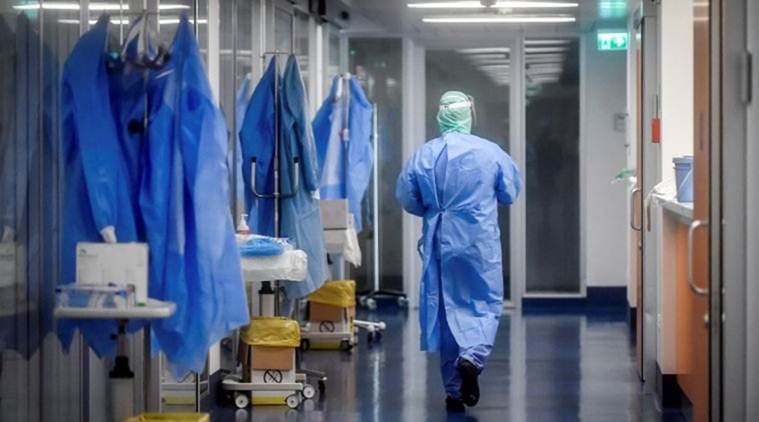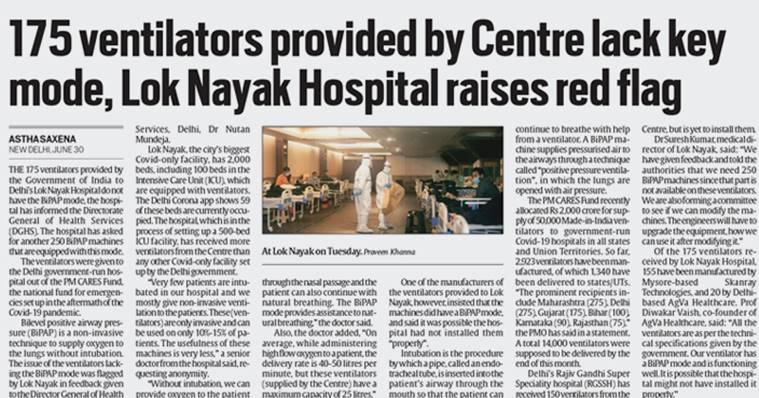 “We have received a call from the company today saying some changes have to be made in the ventilators. A team of experts will visit the hospital in a day or two,” said a senior doctor from the hospital.
“We have received a call from the company today saying some changes have to be made in the ventilators. A team of experts will visit the hospital in a day or two,” said a senior doctor from the hospital.
After Delhi’s Lok Nayak Hospital raised red flags over 175 ventilators provided by the Government of India, saying they do not have the BiPAP mode, a team of experts from Bharat Electronics Limited (BEL) will visit the hospital to address concerns. The company has the manufacturing license for the machines, produced by Mysore-based Skanray Technologies.
The ventilators were given to the Delhi government-run hospital — the capital’s largest Covid facility — out of the PM CARES Fund.
Bilevel positive airway pressure (BiPAP) is a non-invasive technique to supply oxygen to the lungs without intubation. As reported by The Indian Express, the issue was flagged by Lok Nayak in feedback given to the Director General of Health Services, Delhi, Dr Nutan Mundeja. The hospital asked for another 250 BiPAP machines equipped with this mode.

While 155 ventilators have been manufactured by Skanray Technologies, 20 are by Delhi-based AgVa Healthcare. “We have received a call from the company today saying some changes have to be made in the ventilators. A team of experts will visit the hospital in a day or two,” said a senior doctor from the hospital.
On Tuesday, Dr Suresh Kumar, medical director of Lok Nayak, had told The Indian Express: “We have given feedback and told the authorities that we need 250 BiPAP machines since that part is not available on these ventilators. We are also forming a committee to see if we can modify the machines. The engineers will have to upgrade the equipment, how we can use it after modifying it.”
According to experts, ventilators provided to the hospital are high-end models and can “simulate” the use of BiPAP mode in the presence of a technician or doctor.
The hospital also wrote an email to AgVa healthcare to seek clarifications on the machine’s specifications. Prof Diwakar Vaish, the company’s founder, said: “We have responded to the hospital. Our machines have a BiPAP mode.”
A senior doctor said that while BiPAP and CPAP modes “aren’t directly available as menu items”, it has been conveyed to the hospital that there are modes that can emulate these functions. These alternative modes are pressure support ventilation (PSV) and pressure-controlled synchronised intermittent mandatory ventilation (PC-SIMV).
M V Gowtama, chairman managing director of BEL, said the machines are produced as per specifications provided by a technical committee formed by the Ministry. “We have told Delhi hospitals that we have two modes — PSV and PC-SIMV, which can emulate CPAP and BiPAP modes respectively. We have suggested to them to use these two modes. The hospital will also share a questionnaire to get details on technical guidance. The machines are capable of providing BiPAP through a graphical user interface.”
The Ministry also wrote a letter to Delhi’s Principal Health Secretary Vikram Dev Dutt. “It is to reiterate that all concerned may kindly be advised to refer to the specifications of these ventilators and user manuals for any clarity, and provide timely objective feedback about the specifications which these ventilators are required to meet,” wrote Mandeep K Bhandari, joint secretary, MOHFW.
Tuesday’s letter also has a section called “acceptable deviations in essential features”. Here, against the ‘essential technical feature’ that “the machine should have invasive, non-invasive and CPAP features to make them versatile” is an ‘acceptable deviation’: “Pressure support ventilation mode available can be used in place of CPAP and BPAP”.
The Ministry also clarified that the ventilators supplied to states and UTs by the Ministry of Health and Family Welfare are meant for ICUs. “Ventilator models BEL and AgVa supplied to the States/ UTs are complying with requirements as per the specifications laid down by the Technical Committee. These cost-effective, made in India ventilators have BiPAP mode and other such modes as have been prescribed in technical specifications. The ventilators are being supplied along with user manuals and feedback forms which must be referred to for clarity,” said a statement issued by the Ministry.